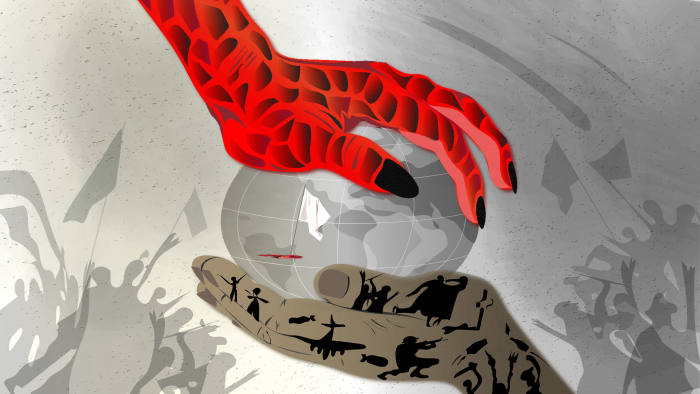The Faustian bargain of nationalism
We are witnessing an upsurge of the most malign forms of this powerful social force
Martin Wolf

The history of humanity’s rise from savannah ape to masters of the planet is one of Faustian bargains. The agricultural revolution brought huge increases in population, but lowered living standards for many. What is true of productive systems is also true of ideologies. Of none is this more true than nationalism — an engine of both development and destruction. We need to recognise and manage both aspects of its personality — the beneficent and the diabolical.
Nationalism is, above all, an extraordinarily powerful social force. As we were reminded by the commemoration of the 1918 armistice, tens of millions of people have fought and died in national armies, often willingly, since the beginning of the previous century. They died en masse for what Benedict Anderson called an “imagined community”: “imagined”, because the vast majority of its members are unknown to those whose national identity they share, and “community”, because it recognises a primary bond of loyalty and support. Such bonds cannot easily be inserted into the economists’s framework of utility maximising rational individuals. They plug into something far deeper: nationalism is a secular religion that sanctifies the idea of the nation.
Human beings are intensely social. It is entirely natural for them to identify with something larger than their individual selves. Initially, however, these communities were both small and familial. Most of our subsequent political entities did not expect their subjects to feel a close identity with the state: they mainly demanded obedience. The mobilised nation state and the intense identity it promotes are roughly a product of the past 200 years, although, in the west, they echo the values of the ancient city states. Our modern starting point might be the levée en masse (mass conscription), brought in after the French Revolution.
The late British-Czech philosopher Ernest Gellner made striking contributions to our understanding of the economic benefits of nationalism. Its essence, he argued, was the imposition of a culture of universal literacy in a common language, largely through a national system of education. This, in turn, demanded the creation of national institutions and supported the emergence of a national economy. This new ideology not only accompanied, but actively promoted, a more flexible way of life, while the old agrarian economy, with its yeoman farmers, serfs and feudal lords, faded away into history. Nationalism was one of the midwives of industrialised modernity.
A modern nation state has benign, less benign and malign consequences. Among the benign is the emergence of a populace with a shared language and so able to co-operate more easily and move more freely among economic activities. Moreover, the new emphasis on a shared culture and national identity led quite naturally to demands for democracy: if everybody was a full member of the national community, surely everybody also deserved a voice in its destiny. And, as a consequence of the combination of nationalism with democracy, the welfare state arrived. The latter insured people against the risks created by a dynamic market economy, in which livelihoods might disappear from one day to the next. But it simultaneously strengthened bonds of national identity.
Among the less benign consequences is the opportunity for rent-seeking: how attractive it has always seemed to wrap the flag around one’s sectional interests. Those unfair foreigners — people cry — are undercutting virtuous fellow citizens. Yet something deeper than mere greed is at work. Their passport is the most valuable asset owned by most citizens of high-income countries. Inevitably, many dislike sharing it freely. That they see this in “identity” terms is natural, precisely because a passport is an expression of identity. Control over immigration is thus an unavoidable corollary of the democratic welfare state.
Among the outright malign results of nationalism is the use of xenophobia as a path to power. The more economic outcomes diverge within a nation state, the more easily cynical politicians can persuade anxious citizens that their interests are being sacrificed to those of a “globalist” — that is, treacherous — elite and its foreign associates and servants. The view that those who think globally are traitors is not surprising. It is a natural result of national feeling.
Since the middle of the 20th century, nationalism has gone global. In China, for example, we see the creation, for the first time in its history, of a Chinese nation state. It is no surprise, then, that it cannot deal well with its minority communities. In highly complex societies, such as India, creation of an overarching national identity is even harder.
Today, we are witnessing the resurgence of malign nationalism across the west and, most significantly, in the US. We even have the spectacles of people promoting an International of nationalists. Meanwhile, the US secretary of state, Mike Pompeo, ridiculously, recommends co-operation and the dismantling of institutions that make it work.
Nationalism is surely the strongest political force of our era. In its benign form — call this “patriotism”, if you will, as George Orwell once did — it is the foundation stone of the world’s most successful political entities. In its malign form, however, it is an enemy of the peace and co-operation on which our future depends. If we cannot contain its malign aspects, it will surely destroy us.
0 comments:
Publicar un comentario